Cliff Mass Weather and Climate Blog: The University of Washington Should Not Censor Faculty Social Media
This blog will describe a series of serious violations of freedom of speech and academic freedom at the University of Washington.
It will describe how a highly partisan Dean and her senior staff at UW’s College of the Environment (COENV) have suppressed diversity of viewpoints and censored the social media of faculty and staff, including this blog. I will review apparent violations both of the faculty code and constitutionally guaranteed freedom of speech.

What I will describe should concern you, no matter where you are on the political spectrum. Progressive or Conservative, Democrat, Republican or Independent, you should care deeply about the suppression of viewpoint diversity and the restriction of freedom of speech in favor of the partisan agenda of a group of university administrators.
Their actions are a direct threat to the very nature of the University of Washington and our democracy. And I need your help to rectify the situation.
“Whoever would overthrow the liberty of a nation must begin by subduing the freeness of speech.” Benjamin Franklin
_________________________________________________________________________________
Initiative 1631 and the Leadership of UW’s College of the Environment
A stunning example of inappropriate behavior by COENV leadership deals with Washington State Initiative 1631. This initiative, on the Washington State ballot in November 2018, was an attempt to pass a carbon fee, with the proceeds distributed by a board dominated by politically connected groups. It was highly partisan and lost decisively (by 13%).
Leadership of the College of the Environment was strongly in favor of this measure and expressed their support publicly in many ways:
(1) Dale Durran, the Chair of the Atmospheric Sciences Department and a member of the College’s Executive Committee, asked the faculty to sign a letter supporting 1631, which was later published in the Seattle Times , signed by 21 faculty members . Is this appropriate for the Department Chair, who has substantial influence over salaries, sabbaticals and advancement in the department?
(2) The College Dean, Lisa Graumlich, and several associate Deans publicly supported the measure, signing widely circulated public letters citing their university affiliation , and tweeting their support (such as one by Associate Dean of Research Robert Wood).
(3) The COENV PCC program website featured Chairman Durran’s letter in support of 1631, which was potentially an illegal use of university resources to support a measure (see below).
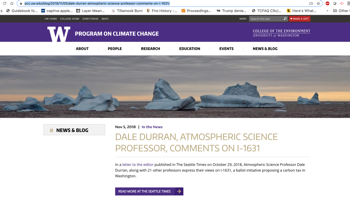
But if you were a faculty member in the College of the Environment and you had a different viewpoint than College leadership regarding this initiative, they were prepared to make your life very difficult. And by doing so, they may have violated Federal law and university regulations.
Let me tell you a story. My story.
Although I am a strong supporter of carbon taxes and was a very public proponent of I-732, the previous carbon tax initiative, I opposed 1631 for several reasons. I felt I-1631 was highly regressive, disproportionately taxing low-income individuals and families. It lacked specific guidelines on how the money would be spent. A partisan group of organizations was hardwired to control and direct the funding, and the public goals of the proposal were highly deceptive (“clean air”). In addition, 1631’s carbon fee started out too low to be effective (half that of 732). And the highly partisan nature of 1631 would undermine bipartisan efforts on climate change, which I believe are crucial.
I agreed to be a signatory for the statement against I-1631 in the official voter’s pamphlet and did a few blog posts on the subject. These blogs were in social media completely outside of and had no connection to the University of Washington.
My stance was not popular among the college’s activist students, my department chair (Dale Durran) and the COENV Dean’s office. The pro-1631 students used social media to call me all kinds of names, as did one vocal post-doctoral researcher in oceanography. They stated that I was in bed with oil companies, was on the payroll of the Koch brothers, was racist, misogynistic, a climate denier, and other names I would not repeat in a family friendly blog (see picture below for a tame example). It is all documented on twitter. The Seattle Stranger called me Trump’s Weatherman and repeated the student’s accusations and pictures.
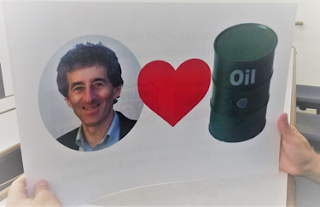

Although unpleasant, I tolerated the student name calling and the nonsense in the Stranger in the spirit of freedom of speech, diversity of ideas, and acknowledging the self-righteousness/idealistic nature often associated with youth. Tolerance for differing opinions should be in the DNA of all university faculty.
A few of the activist students went to the department chair (Dale Durran) and the Dean’s office to complain about my blogs on 1631. They particularly didn’t like my blog “ If You Worry About Climate Change and Care About the Environment, Vote No on I-1631 “ In that blog, I discussed the issue of politically well-connected groups securing funds at the public trough and used the century-old political metaphor of “pigs at a trough”, not in the text, but in a single picture (see below).
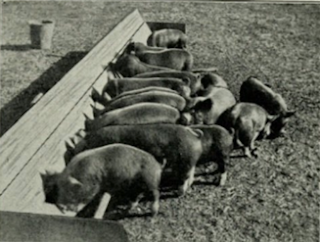
This metaphor is frequently used in the media and books, such as Arianna Huffington’s hard hitting book on political corruption in America, which described the greed of the politically connected (see below).
The activist students claimed that such a metaphor was racist because some members of the 1631 consortium were from minority groups. They ignored the fact that the 1631 coalition was overwhelmingly white and well-to-do. The fact I was expressing political opinions outside the UW did not seem important to them, nor did they care about the concept of freedom of speech. They wanted the department and college administration to do something about me and my blog .
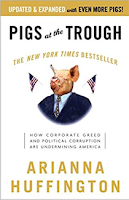
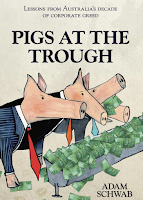 Will the College of
Environment Deans Accuse Arianna Huffington of Racism? Or Australian Adam Schwab?
Will the College of
Environment Deans Accuse Arianna Huffington of Racism? Or Australian Adam Schwab?
And shamefully and potentially illegally, the Atmospheric Sciences chair and COENV Deans, ignoring First Amendment protections and the essential principles of an academic institution, did exactly what the students wanted .
Between the end of October and early November 2018, Department Chairman Dale Durran, COENV Associate Dean of Research Robert Wood, COENV Associate Dean of Administration Stephanie Harrington, and COENV Assistant Dean of Diversity Terryl Ross wrote a letter attacking my blog that was formally approved by Dean Lisa Graumlich. (all of this is documented in their internal emails).
Their letter, “Message on Departmental Civility”, was sent to MY ENTIRE DEPARTMENT (including staff, faculty, and students—over 120 people) on November 22, stating that my blog “included imagery and text that was racially insensitive and caused offense.” The letter accused me of racism through the statement “Racism is in direct contradiction to our shared values and has no place in our college” as well as suggesting that I harmed the community through my blog.
This letter was not only inappropriate and arguably unethical but a violation of University of Washington faculty code, including the protection of academic freedom.
UW administrators were sanctioning and shaming a faculty member inside the university for expressing political free speech outside of the UW: also an apparent violation of constitutionally protected freedom of speech at a public university . Importantly, freedom of speech is protected BOTH inside and outside a public university by the U.S. and Washington State constitutions.
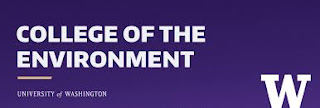
The actions of the COENV Deans appeared to be a direct violation of UW Faculty code 24.33:
Faculty members have the right to academic freedom and the right to examine and communicate ideas by any lawful means even should such activities generate hostility or pressure against the faculty member or the University. Their exercise of constitutionally protected freedom of association, assembly, and expression, including participation in political activities, does not constitute a violation of duties to the University, to their profession, or to students and may not result in disciplinary action or adverse merit evaluation.
Furthermore, COENV leadership apparently violated several other sections of the faculty code, which required the atmospheric sciences chair to meet with me before making any accusation (Faculty code section 25.71 B), that I be notified of any charges before taking disciplinary steps, and by the Dean’s refusal to meet me in person when I requested it.
But the situation was about to get far more serious.
After the letter was released, I protested that it was both illegal and unfair, which led Atmospheric Sciences Chair (and publicly declared 1631 proponent) Dale Durran, with the knowledge of the Dean’s office, to call a DEPARTMENT WIDE meeting on December 5 to discuss my blog.
Everyone in the department was invited and refreshments were offered (including chicken wings). With the promise of both controversy and catered food, there was a large crowd—including students, staff, and faculty. Department Chair Durran dictated that no outsiders could come to document the gathering. It was a gathering that ended up more like a spectacle at the Roman Coliseum than an academic proceeding at a leading research university.
 UW 2018?
UW 2018?
The University Ombud, Chuck Sloan, was supposedly going to run the meeting. He did not. The meeting began with Chuck Sloan saying a few words, but rapidly it was taken over by Atmospheric Sciences Chair Dale Durran. And the gathering turned dark quickly.
Durran called on the activist students, who made a range of comments critical of my blog. As I tried to talk about the concept of freedom of speech, Dale Durran started screaming at me, telling me to stop. When I protested I wasn’t finished speaking, he screamed even louder. This went on for a while, with both of us talking at the same time, before the Ombud Sloan said I should be allowed continue.
But a minute later Dale Durran started screaming at me again to stop, preventing me from finishing. Then he called upon several more “offended” students and one staff member, who went on the attack, accusing me of racism and worst. One of the students stated that I would be “held accountable” for my blog and opposing 1631. It was a direct threat. And no one said a word about it.
Afterward, several faculty who had attended the gathering told me they were afraid to speak in my defense. One, a full professor and past chair, told me that what had happened was very wrong but he was scared to talk.
Another faculty member, who was originally from China and lived through the Cultural Revolution told me it was exactly like the shaming sessions of Maoist China, with young Red Guards criticizing and shaming elders they wanted to embarrass and remove.
One of my graduate students was in tears.
 UW 2018?
UW 2018?
To have such a scene occur at a public university was a violation of both faculty code and the basic principles of the university. But Department chair Dale Durran and the COENV Dean’s office saw nothing wrong with it.
Some local and national media , and nation-wide blogs , found out about the situation from others and described what happened.
Considering the grievous nature of what occurred, I went to the Secretary of the Faculty for guidance. He acknowledged what had happened was very serious and arranged for mediation. The faculty secretary also noted that the UW lacked a policy to deal with the issue of social media and faculty freedom of speech.
Over the past 6 months, a number of media outlets have contacted me regarding doing major stories on what occurred. I have put them off, feeling that the situation was so serious for the UW that it would be better to resolve the situation quietly and internally. I expected that UW leadership (President and Provost), once aware of the situation, would quickly take steps to ensure that such serious violations of academic freedom and first amendment protections did not happen again.
The COENV Dean’s office and Dean Graumlich have refused to acknowledge the inappropriateness and illegality of the letter and shaming meeting, and so far neither the UW President nor Provost have acted to address the situation.
The mediation ended a few weeks ago; that is why I am writing this blog now.
Hypocrisy
Stephanie Harrington, the Associate Dean of Administration for the COENV, told me that is was appropriate for them to send me the racism-accusation letter and hold the shaming meeting. She explained that since my blog (the CLIFF MASS WEATHER AND CLIMATE BLOG) had no visible disclaimer that it was not speaking for the UW, some people might confuse my blog for an official UW statement. Furthermore, she noted that my blog had an invisible metatag in the html code that indicated I was a UW professor. Therefore, the College had the right to send me a letter calling me a racist. This makes no sense.

The claims of Dean Harrington, a staff member of the College, were baseless and apparent attempts to avoid responsibility for serious violations. Freedom of speech does not require a disclaimer in one’s outside social media. Nor does UW faculty code. So there was no legal basis for her claim. And I should note that after writing over a thousand blogs and received tens of thousands of comments, NO ONE has ever suggested that I am speaking for the UW. My name is on the blog, not the UW.
But now we get to the hypocrisy part . Members of the UW Dean’s office are making partisan and political comments all the time in the media and social media WITHOUT any disclaimers. So Dean Harrington’s “rules” don’t seem to apply to them.
Take Dean Lisa Graumlich. She attended the January 2019 State of the Union speech as a climate scientist protestor as guest of Congresswoman Jayapal (D. WA). Dean Graumlich was quoted widely in the media as the UW COENV Dean, with no attempt to clarify that she was not speaking for the UW when she provided politically laden comments. And her political activities were spotlighted in the College’s official newsletter .


Associate Dean Rob Wood, one of the main authors of the shaming letter, was busy tweeting his support of 1631—done without a disclaimer (see below).
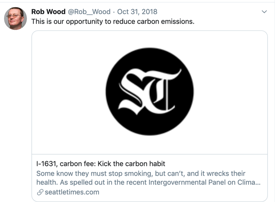
I could give you more examples, but clearly the actions of College leadership do not suggest concurrence with Stephanie Harrington’s novel theory on why the Dean’s office can invade academic freedom.
And talking about partisan activities within the College, in the weeks after Trump’s victory, the chair of my department held a departmental meeting to discuss student fears of the impacts of the new President. This was totally inappropriate in a public university.
Can you imagine an official university gathering on campus to talk about the negative implications of Barack Obama’s election? It would have been correctly deemed racist, inappropriate, and offensive. But apparently such activities are perfectly fine when a Republican wins. This meeting sent a clear message regarding the “approved” politics in my department. Some moderate and conservative students told me how uncomfortable they were. They felt excluded and minimized, and afraid to discuss their different viewpoints.
The bottom line is that a highly partisan group leading the College of the Environment are willing to dispense with basic academic freedom and constitutionally guaranteed rights to suppress views they don’t like.
Although the 1631 example above shows an apparent breach of values and faculty code in the UW College of the Environment, perhaps even worse has been the suppression of science that does not support the partisan agenda of COENV and departmental leadership. Let me provide two examples.
Oyster deaths and ocean acidification
In September 2013, the Seattle Times ran a glossy series called “Sea Change”, which claimed that ocean acidification caused the deaths of untold numbers of local oysters in factory nurseries. There were serious technical problems with the article, including the fact that the oyster deaths were of a non-native species in industrial nurseries and that the problem was not really the small amount of acidification by increasing CO2, but rather the mistaken ingestion of less basic upwelled water (as noted by many sources, including leading NOAA scientists). Furthermore, several of the oyster farms were spraying herbicides and pesticides over state waters and greatly disturbing fragile coastal areas (issues that came out in 2015 in story by the Seattle Times Danny Westneat).

Anyway, I did several blogs about the subject because I felt that the public should know that there were important errors in the Seattle Times article.
A week or two after my second blog on the topic I got a call from my chair. Dean Lisa Graumlich was “concerned” about my blog and wanted the department chair to talk to me about it. It was also pointed out that the College was receiving a large amount of State funds for a UW acidification center and that the Governor had been hailing the dying oysters as evidence of the grave impact of increasing CO2. In short, a false narrative was supporting the Governor’s claims and providing millions of dollars to the college. The clear message: I should lay off.
So I was being called on to the carpet by the UW Dean for material in my non-UW blog.
Northwest Snowpack
The history of politicized suppression of science goes back to the roots of my college. Back in 2005-2006, a few local politicians (such as then Mayor Greg Nickels) and some UW climate impacts folks were claiming that the Cascade snowpack was rapidly disappearing (50% loss!) and the anthropogenic global warming was the cause. A UW researcher and previous Washington State Climatologist Mark Albright analyzed the snowpack information and found little decline, and he mentioned this fact on a few local electronic mailing lists.
The State Climatologist at that time (Phil Mote) and member of the Climate Impacts Group (now a part of the College) was an author of a paper claiming draconian snowpack loss and warned Mark Albright to refrain from communicating his analysis to others. When Mark rightfully refused, Mote fired Mark Albright as Associate Climatologist. This action hit the media, went viral, reaching local newspapers and even got covered by CNN. A very serious breach of the academic freedom.
When I objected to Mr. Albright’s firing and the exaggeration of the snowpack loss, I was told that although I might be scientifically correct, I would be helping “climate deniers” if I gave the correct information. I needed to stand with those pushing excessive numbers, to get people to do the “right thing.” Even for the wrong reason. According to some of my colleagues, the ends justify unethical and untruthful means. I just couldn’t go there.
During the past ten years, there has been calls by some faculty and even a COENV administrator to have Mr. Albright “retired” or to have his ability to communicate on electronic email lists restrained. Some called him all kinds of unfortunate names ("denier", skeptic, etc.).
I should note that he, I and Dr. Mark Stoelinga wrote a paper describing only modest loss in Northwest snowpack, a paper that was accepted in a leading peer-reviewed journal. The snowpack loss today? Check the figure showing the Northwest snowpack since the early 1980s; nearly unchanged. Mark Albright was right.

The COENV Dean’s Office Returns to Restraining Free Speech
Recently, UW Research Scientist Mark Albright has been actively contributing to a department email listserv on climate (this is an email distribution list for those interested in the topic). One student recipient was so unhappy about his comments she threatened to quit the list (she was one the prime complainers about my 1631 blog).
A few days later, the Dean’s office contacted my department chair with “concerns” about department's climate listserv, saying that Mr. Albright’s comments were an inappropriate use of state resources. With pressure from the Dean’s office, the chair suspended the climate listserv. Just chilling.
This week, I got an email from COENV Associate Dean Harrington, telling me that Mark Albright’s contribution to the email listserv was a violation of state ethics laws, and that I should deal with it as his supervisor. Why a violation? Because he criticized the climate viewpoint of a candidate for the Democratic nomination. I pointed out that Dean Harrington was misinterpreting the relevant state law, that Mark’s comments were perfectly legal, and what she was doing was a potential violation of freedom of speech. Dean Harrington has yet to respond to me.
The Return of the McCarthy Era at the University of Washington?
One of the most shameful incidents in the distinguished history of the UW was the red scare of the 1950s, when several UW faculty were fired or shamed because they were accused of having communist sympathies. Some saved themselves by signing a loyalty oath. Today, UW College of the Environment leadership appears to be following the 1950s playbook, attempting to shame and sanction folks with different viewpoints, particularly on highly political issues. Instead of a loyalty oath, there is my department chair’s letter in support of 1631. Many folks are terribly disturbed by President’s Trump’s plans to “build a wall” but they are happy to build intellectual or procedural walls to keep out viewpoints they disagree with. Tyranny can come from either the right or left. Both are bad.

How you can help
Academic freedom and freedom of speech are acutely threatened at the University of Washington’s College of the Environment by the actions of the Dean and other college leadership.
As only one faculty member, I simply don’t have the clout to fix this alone. Furthermore, my ability to tell you honestly about what I believe regarding climate and other topics in my blog is threatened.
Now I need your help. The only individuals with the real power to fix this situation are the UW President, Provost, and members of the Board of Regents. Let them know that you value academic freedom and constitutionally protected freedom of speech (contact information at the end of this blog). Tell the UW administration you expect the COENV leadership to follow university rules and to protect diversity of viewpoints. If you use social media, let you friends know about the problem and ask them to assist.
UW President Ana Mari Cauce and Provost Mark Richards are responsible for what happens now. Are they going to deal with serious violations by the leadership of the COENV? Will they protect a diversity of viewpoints at the UW? Or will a highly partisan college leadership group be allowed to continue on their current path?
At the very least, Dean Graumlich should apologize for authorizing the inappropriate letter, acknowledge that it was done in violation of faculty code and constitutional protections, and affirm that such a situation will never happen again. Similarly with ex-chair Dale Durran, Associate Deans Wood and Harrington, and Assistant Dean Ross. President Cauce and Provost Richard must establish a policy that robustly defends faculty and staff freedom of speech.
I do find reason for optimism in the words of UW President Ana Mari Cauce, given in her message of October 17, 2017:
“ Speech by people we strenuously disagree with …. is the price we pay for democracy and to ensure our own freedom of speech. … If a self-appointed group is able to use intimidation or violence to decide what speech is acceptable — no matter if they are well-intentioned or even if we share their opinions — then we’ve taken a step toward a society where “might makes right.”
There is great wisdom in President Cauce's words. Will she take the steps needed to support them? I truly hope so.
Contact information: UW President Ana Mari Cauce: president@uw.edu UW Provost Mark Richards: provost@uw.edu UW Board of Regents: regents@uw.edu Chair, UW Faculty Senate: jwj@uw.edu ______________________________________
Brief BioSketch
I am a full professor of atmospheric sciences at the University of Washington. I specialize in weather systems, weather prediction, and regional climate research and have published over 100 papers in the peer-reviewed literature. During the past year I have been chair of the College of the Environment College Council, the only democratically elected representative body of the College. I am the author of the book, the Weather of the Pacific Northwest, and was a student of climatologist Stephen Schneider and Astronomer Carl Sagan. I have a B.S. in physics from Cornell University and a Ph.D. from the University of Washington.